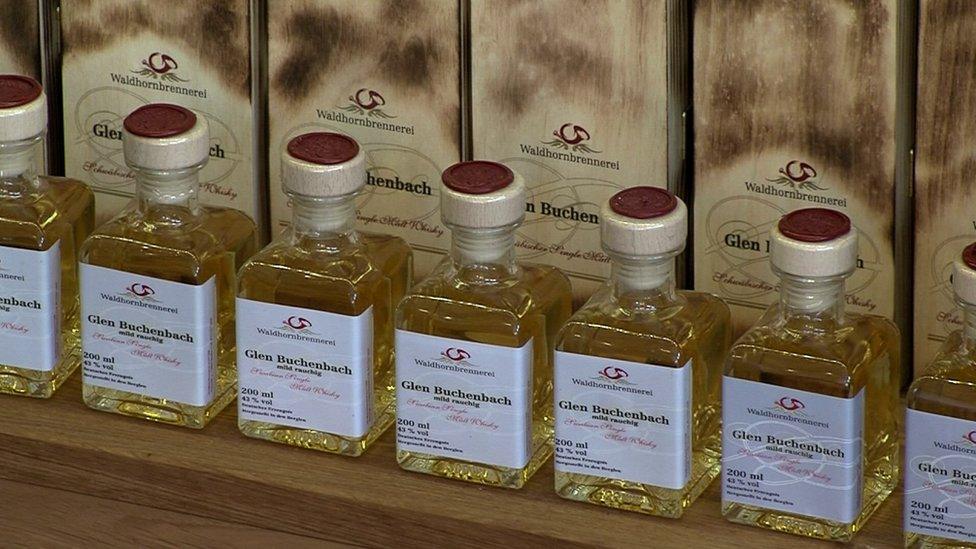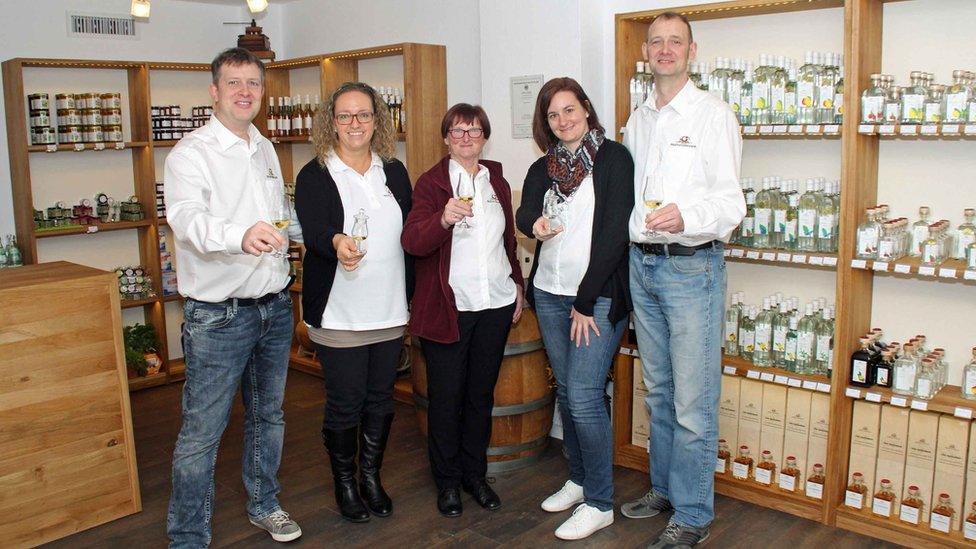Does the word Glen on a bottle mean the whisky is Scotch?
- Published

Glen Buchenbach is produced in the municipality of Berglen near Stuttgart
When a German drinker looks at the range of drinks available at a bar and sees the word Glen on a bottle, what does that evoke?
A stag surveying a misty Scottish loch, where an artisan distillery works its magic on the purest of mountain water. Or a municipality in Baden-Württemberg? Or neither?
That's the question that has been considered by the European Court of Justice, in ruling on a case brought by the Scotch Whisky Association.
The trade body is trying to use the European law on Geographical Indicators to stop a single malt whisky from using Glen in its name.
It won a minor victory in the ECJ ruling, issued on Thursday, which says that context doesn't count for anything.
So it doesn't seem to matter that the spirit's full name is Glen Buchenbach, or that the bottle has the name of the distillery prominently above that - 'Waldhornbrennerei', meaning the Waldhorn distillery.
It explains very clearly on the label that it is Deutsches Erzeugnis (a German product) and that it is Hergestellt in den Berglen (produced in the Berglen).
It also says, in English, that is is Swabian single malt whisky.

The team behind Glen Buchenbach whisky say their product makes no other reference to any association with Scotland
The distillery is located in the municipality of Berglen near Stuttgart, which helps explain how the word Glen might have made it onto the label.
On its website - where a half-litre of Glen Buchenbach can be purchased for €49.50 - it is explained that the word glen is from the Gaelic language and means "in the valley of", but makes no other reference to any association with Scotland.
The ECJ ruling is very specific about the type of German, or other European, who is gazing across the bar at the range of spirits:
"The Court holds that the decisive criterion for finding there to be an 'evocation' of the protected geographical indication is whether, when an average European consumer who is reasonably well informed and reasonably observant and circumspect is confronted with the name of the product concerned, the image triggered in his mind is that of the product whose indication is protected."
So does the European Court of Justice speak for that informed, observant, circumspect European in ruling whether Glen evokes the mists and mysteries of a Scottish valley?
No. It is sending its ruling back to the regional court in Hamburg, to apply that test.
Added protection
The Scotch Whisky Association has a legal department that pursues those it deems to be passing off non-Scottish spirits as having a link with Scotland.
Several countries have agreed to UK and European pressure to introduce legal protections against those who would counterfeit or wrongly pass off spirits as Scotch whisky, and some have added protection for Speyside, Highland and Islay.
The Geographical Indicator protection under European law is playing a significant part in Brexit negotiations.
The European Commission wants Westminster, post-Brexit, to write into law a continuing protection for all of the products currently covered by the GIs, including Champagne, Parma ham and numerous local specialities.
In the UK, this has extended beyond Scotch whisky to include Stornoway black pudding and the Arbroath smokie.
The UK government has so far been resistant to this, as it does not want to be required to put European law into future laws in Britain.
Particularly where that could interfere with future trade deals being struck with other countries.